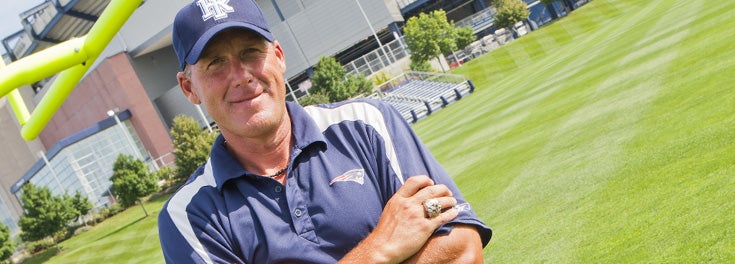
You don’t have to be a sports superstar to wear the bling associated with being a world champion. Dan Cunningham ‘89 and Jeff Gennarelli ‘03 have five World Series rings between them, and Jon Bengtson ’94 proudly wears two Super Bowl rings, yet none of them has ever played for a championship team. Instead, they earned their rings by ensuring that their teams’ playing fields are in immaculate condition.
The URI turfgrass research program is the oldest in the country, and among its strengths is training students how to grow, nurture, and maintain the highest performance turf possible. Graduates of this program are responsible for every blade of grass at some of the most prestigious golf courses and sports stadiums in the country. And thanks to that strong alumni network, current URI students studying turfgrass management have internship opportunities at the likes of Fenway Park, Gillette Stadium, the Meadowlands, and numerous country clubs that have hosted the nation’s most celebrated golf tournaments. “At this level of competition, the value of our professional network is priceless,” said Agronomy Professor W. Michael Sullivan.
URI turf, grown on campus and farms throughout West Kingston has been used at MetLife Stadium for a World Cup soccer match, on a soccer field in Athens, Greece, for the 2004 Summer Olympics, at Chicago’s Soldier Field, and on six athletic fields in the country of Oman.
“Most linoleum floors have more irregularities than an elite putting green,” said Sullivan, who travels the world to consult on turf management and sustainable golf course design. “Players expect the ball to roll the same on every green all day long, regardless of the weather, so the pressure on the course superintendent can be pretty high.”
“There is strength in golf and sports turf management, as it’s a growing segment in the green industry,” said Sullivan. “Because of the vast amount of youth sports, men’s and women’s sports, colleges, and private clubs, employers want qualified people to maintain the surfaces. They are coming to URI to find that talent.”
Other focus areas of the program include the study of plant pathology and the development of transgenic grass varieties—those with the perfect color, texture, drought tolerance, and insect resistance. Research findings are central to our turfgrass outreach programs in the way of engaging local golf course superintendents, sod growers, sports turf managers, and the public in using and giving feedback on new grass varieties and pest management strategies.
For championship players, victories are won on the field. But for URI Turf Management students, the victory is the field itself.
